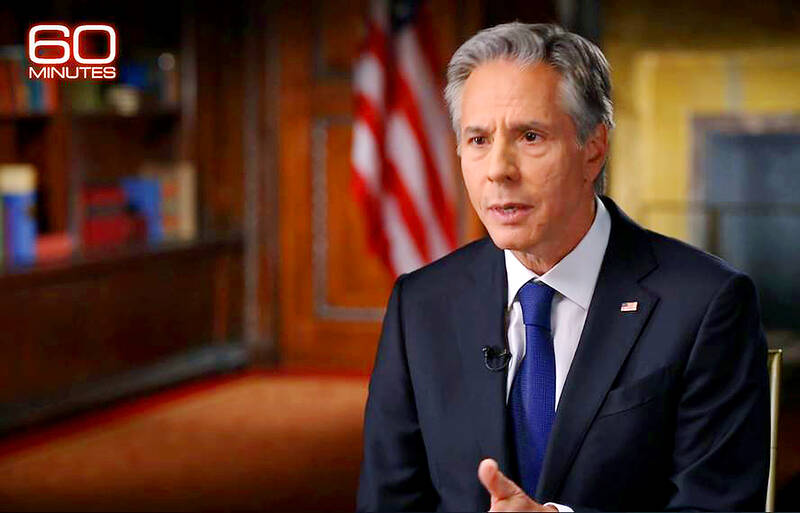If Taiwan were attacked, the global economy would face devastation, as that is where most of the world’s semiconductors are produced, US Secretary of State Antony Blinken said on Sunday.
In an interview that aired on the 60 Minutes television program, Blinken was asked whether instability across the Taiwan Strait would be felt around the world.
Blinken said that China has been increasingly aggressive against Taiwan, posing a threat to peace and stability in the region, while economically the world would feel the effects of such aggression.

Photo: screen grab from CBS
Blinken was interviewed for the program after meeting with Chinese Minister of Foreign Affairs Wang Yi (王毅) on the sidelines of the UN General Assembly in New York on Friday.
The US has invested heavily in its semiconductor capacity, with US firms designing chips that are primarily produced in Taiwan, he said.
“Taiwan itself, were anything to happen, it is where virtually all the semiconductors are made,” Blinken said. “If that’s disrupted, the effects that that would have on the global economy could be devastating.”
In an interview that aired on the previous Sunday on the same program, US President Joe Biden said that the US would defend Taiwan “if in fact there was an unprecedented attack.”
It was the fourth time Biden implied the US would help Taiwan, although each time it has been followed by a clarification from administration officials who seemed to walk back his comments.
When Blinken was asked whether Wang requested clarification of Biden’s remarks when they met, he said they had a conversion about the two approaches toward Taiwan.
“I reiterated what the president has said, and what he’s said clearly and consistently — our continued adherence to the ‘one China’ policy, our determination that the differences be resolved peacefully,” Blinken said.
“Our insistence that peace and stability be maintained in the Taiwan Strait, and our deep concern that China was taking actions to try to change that status quo. That’s what the issue is,” he said.
The US has over the past few decades maintained a stance characterized as “strategic ambiguity” regarding whether it would aid Taiwan’s defense in the event of an attack by China.
Washington has traditionally been deliberately vague about whether the US would do more than provide Taiwan with weapons, as per the Taiwan Relations Act, and send troops to fight China.
The act became law in 1979 to maintain commercial, cultural and other unofficial relations between the US and Taiwan after Washington switched diplomatic recognition from Taipei to Beijing.
The act requires the US to “provide Taiwan with arms of a defensive character.”

NATIONAL SECURITY THREAT: An official said that Guan Guan’s comments had gone beyond the threshold of free speech, as she advocated for the destruction of the ROC China-born media influencer Guan Guan’s (關關) residency permit has been revoked for repeatedly posting pro-China content that threatens national security, the National Immigration Agency said yesterday. Guan Guan has said many controversial things in her videos posted to Douyin (抖音), including “the red flag will soon be painted all over Taiwan” and “Taiwan is an inseparable part of China,” while expressing hope for expedited “reunification.” The agency received multiple reports alleging that Guan Guan had advocated for armed reunification last year. After investigating, the agency last month issued a notice requiring her to appear and account for her actions. Guan Guan appeared as required,

A strong cold air mass is expected to arrive tonight, bringing a change in weather and a drop in temperature, the Central Weather Administration (CWA) said. The coldest time would be early on Thursday morning, with temperatures in some areas dipping as low as 8°C, it said. Daytime highs yesterday were 22°C to 24°C in northern and eastern Taiwan, and about 25°C to 28°C in the central and southern regions, it said. However, nighttime lows would dip to about 15°C to 16°C in central and northern Taiwan as well as the northeast, and 17°C to 19°C elsewhere, it said. Tropical Storm Nokaen, currently

‘NATO-PLUS’: ‘Our strategic partners in the Indo-Pacific are facing increasing aggression by the Chinese Communist Party,’ US Representative Rob Wittman said The US House of Representatives on Monday released its version of the Consolidated Appropriations Act, which includes US$1.15 billion to support security cooperation with Taiwan. The omnibus act, covering US$1.2 trillion of spending, allocates US$1 billion for the Taiwan Security Cooperation Initiative, as well as US$150 million for the replacement of defense articles and reimbursement of defense services provided to Taiwan. The fund allocations were based on the US National Defense Authorization Act for fiscal 2026 that was passed by the US Congress last month and authorized up to US$1 billion to the US Defense Security Cooperation Agency in support of the

PAPERS, PLEASE: The gang exploited the high value of the passports, selling them at inflated prices to Chinese buyers, who would treat them as ‘invisibility cloaks’ The Yilan District Court has handed four members of a syndicate prison terms ranging from one year and two months to two years and two months for their involvement in a scheme to purchase Taiwanese passports and resell them abroad at a massive markup. A Chinese human smuggling syndicate purchased Taiwanese passports through local criminal networks, exploiting the passports’ visa-free travel privileges to turn a profit of more than 20 times the original price, the court said. Such criminal organizations enable people to impersonate Taiwanese when entering and exiting Taiwan and other countries, undermining social order and the credibility of the nation’s